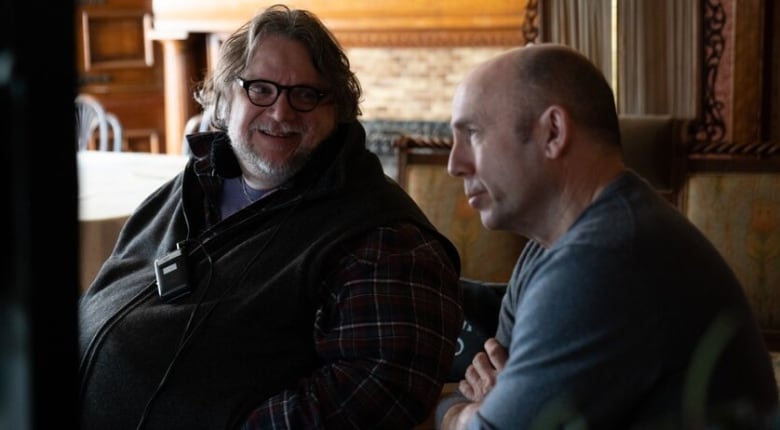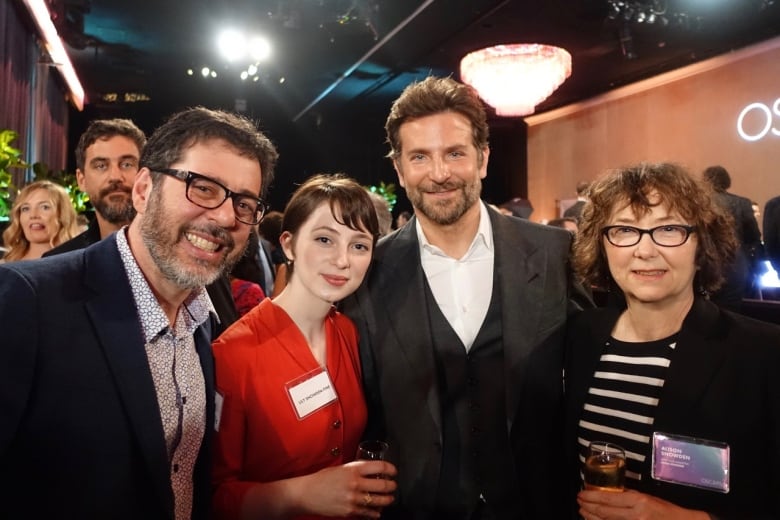Several Canadians will make their way to the Dolby Theatre in Los Angeles on Sunday hoping to come home with a gold statue and an impressive title: Oscar winner.
But after the winners’ names are called, the speeches are made, the photos are snapped and the gold statue is tucked away on a shelf — what does being an Oscar-winner really mean?
“You definitely get your calls returned quicker, I will say that,” said J. Miles Dale, a Toronto film producer who won a best picture Oscar with Guillermo del Toro for The Shape of Water in 2018.
“I think there’s no version where it doesn’t somehow elevate you in the eyes of other people in the business, whether that’s right or wrong, whether that’s perception, reality.”
Dale remembers as soon as the Ontario-shot film hit festivals, something felt different. Audiences and critics were responding, and momentum built as the movie debuted at different festivals.
Months later, the film was nominated for 13 Academy Awards, including best picture. Dale was sitting in the audience with his mom when his name was called as one of the winners.
“It’s like, ‘Oh my God,’ and then you’re up on stage and you’re looking out and it’s like, ‘There’s Spielberg! And there’s Meryl Streep!’ and it’s like, ‘What am I doing here?’ ” said Dale. “It all goes in slow motion, but it’s kind of the best car crash.”
He said the Oscar win put an entire Canadian crew of filmmakers on the map.
That meant that back home in Toronto, Dale could use the new status to make another del Toro movie — Nightmare Alley, starring Bradley Cooper and Cate Blanchett. It got four Oscar nominations including another best picture nod.

Now, Dale is working on del Toro’s Frankenstein. The project, set to star Oscar Isaac, Christoph Waltz and Jacob Elordi, is shooting in Toronto this month.
Looking back, Dale says The Shape of Water‘s win was “a wonderful affirmation” of the work of Canadian filmmakers and crews.
“To be able to shine a light on those people and their careers and their accomplishments was really gratifying,” said Dale.
‘How good are you right now, today?’
Composer Mychael Danna agrees “the effect it has on the people around you” is by far the most lasting part of winning an Oscar.
Danna, who won best original score in 2013 for his work on Life of Pi, says an Oscar win acts as a career buoy for everyone involved.
“We recorded musicians in Toronto. We recorded the orchestra here [in Los Angeles] at the Fox Studios, a big band of 100 people, the choir in London, musicians in India, Indonesia, Middle East,” he said. “I still get emails from the engineer we had in Madras … I mean, it means something.”
But he says translating an Oscar win to further success can be more complicated.
“An Oscar means kind of everything and nothing in this town,” said Danna, who now lives in Los Angeles.
“You still have to get the job, and by the way, you could get fired in a minute and your Oscar wouldn’t save you from that. It’s always, ‘How good are you right now, today?’ “
How does a reporter prepare to cover the Oscars? Eli Glasner takes us on his journey to Los Angeles.
Pay bumps and the ‘Oscar curse’
Economists, financial experts and pop-culture analysts have tried to come up with a quantifiable answer to what an Oscar is worth. One oft-cited analysis claims that winning an Oscar for best actress or actor increases a person’s net worth by more than 300 per cent.
On the other hand, many have speculated about the so-called “Oscar curse,” where a winner has a string of bad luck or bad roles, cutting a promising career short after a win.
Louise Fletcher, for example, won best actress for playing Nurse Ratched in One Flew Over the Cuckoo’s Nest in 1976 and didn’t have much of a movie career afterward. More recently, Adrien Brody and Halle Berry have raised eyebrows over their tepid box office numbers following their big wins in 2002 and 2003, respectively.
Much of the speculation about the worth of an Oscar win focuses on the actors, actresses and directors who take home top honours and overlooks the producers, documentary makers, composers, animators and others who fill out the rest of the broadcast.

Short films meant tangible goals
Like Dale, British Columbia-based filmmakers David Fine and Alison Snowden describe their Oscar win as taking place in “slow motion.” But instead of Spielberg, they remember seeing Tom Hanks and Sharon Stone in the audience.
The couple won for their 1995 animated short Bob’s Birthday, which featured a melancholy but funny story about love over time (and one animated penis). It would eventually become a beloved four-season TV series.
They credit the Oscar with helping them get the meeting they needed to turn Bob’s Birthday into the series Bob and Margaret.
WATCH | The animated short Bob’s Birthday won an Oscar in 1995:
“People went, ‘Oh, you’re an Oscar winner. OK. We’d love to hear what you’re thinking,” said Fine, who remembers being a young filmmaker in Toronto and watching the Academy Awards on TV. He says he was most excited about the short film categories because they felt like a tangible goal.
“Your average young person can aspire to try and aim for an Oscar or awards or festivals just to get their voice heard,” said Snowden.
Changing the course of history
Oscar-winner Ben Proudfoot is back in Los Angeles this week to try to win a second statue.
In 2021, he took home the Academy Award for best documentary short subject for The Queen of Basketball.
This year, the Haligonian filmmaker is nominated in the same category for The Last Repair Shop, about a group of people who repair musical instruments for students in Los Angeles.
For him, the Oscar has meant not only a boost for his resume and the crew behind the documentaries, but a spotlight on his subjects.
“They’re literally toiling away for decades in a windowless warehouse fixing saxophones and violins, and in three days’ time they’re gonna be on the red carpet,” said Proudfoot.
He says that even being nominated has resulted in life-changing moments for some documentary subjects, pointing to Bobi Wine: The People’s President. The film, which documents the 2021 Ugandan presidential bid of a famous Afrobeat musician, is nominated for best feature documentary.
According to Proudfoot, the morning the film was nominated for an Oscar, police withdrew their presence from Wine’s home in Kampala.
“The police that were surrounding that person’s house left because they knew the world was watching, right? That’s genuine impact,” said Proudfoot. “It’s the Oscars changing the course of political history, not just movie history.”
The 96th Academy Awards air Sunday, March 10 at 7 p.m. ET/4 p.m. PT on ABC.


